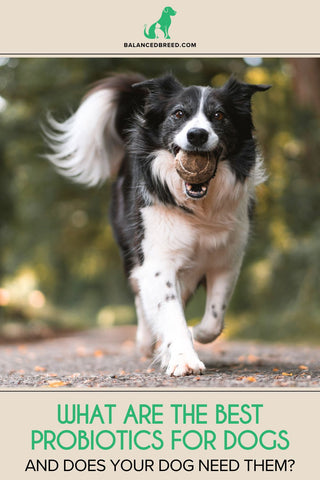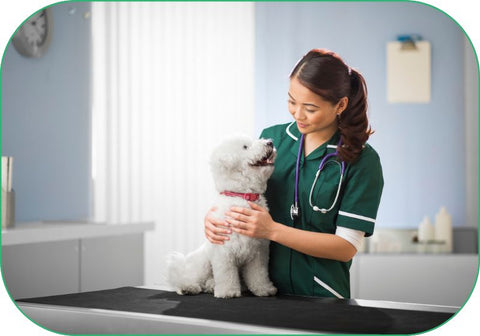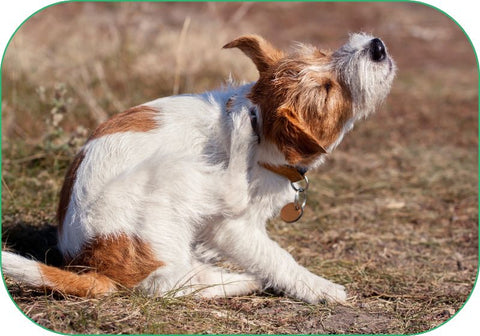What Are the Best Probiotics for Dogs and Does Your Dog Need Them?

Probiotics can have a profound impact on your dog's overall health. After all, they can change the microbiome of your dog's gut, which affects everything from mood to coat health, to digestion.
But does every dog need a probiotic? And how do you know which one to give them?
Pin Me!

What Are Probiotics for Dogs?
Probiotics are beneficial microorganisms you'll find living in your dog’s gut that contribute to a healthy digestive system. These microorganisms are mostly bacteria, but fungi, protozoa, and viruses are in that mix too.
While we often associate bacteria with illness, these actually support your dog's gut health. And, all together, they are called your dog's microbiome.
Probiotics for humans are most commonly found in fermented foods, like yogurt, kefir, or kombucha.

This doesn't mean your dog will benefit from the same probiotics you will. Every species has a different array of flora in their digestive system, so every species' probiotics needs will be different. In short, for your dog to benefit from probiotics, they need to take those that are made specifically for dogs.
Are Probiotics Good for Dogs?
While there haven't been many official research studies into the effectiveness of probiotics for dogs, there are plenty of pet parents out there who have seen numerous benefits for their dogs.
One reported that it helped improve their dog's digestion and that he had more energy to play and run. Another started giving their dog probiotics to improve her digestive health and dry skin, but, to their surprise, the probiotic also helped her get rid of her terrible bad breath.

While not every dog absolutely needs one, most dogs can benefit from them. If your dog has ever been on antibiotics they probably need some help to rebuild their microbiome. Plus, many dogs have nutrient deficits due to only eating a limited- ingredient diet.
If you have any concerns about how probiotics might affect your dog - or if your dog is currently taking any prescription medication - check with your veterinarian first to see if probiotics are the right choice for your dog.
What Do Probiotics Do for Dogs?
All the beneficial microorganisms in your dog's microbiome work together to help maintain your dog's overall health. Without a healthy microbiome, your dog's health will suffer.
That's because that microbiome helps fight infection, strengthens your dog's immune system, aids in food digestion, and more. If something disrupts all those beneficial microorganisms, your dog may show symptoms like diarrhea, allergies, poor health in general, gas, dull coat, itchy skin, and obesity.
Taking probiotics helps support your dog's microbiome and can add diversity that may be lacking. This is especially important if your dog's microbiome has been damaged or impaired.
When to Give Your Dog Probiotics
When Your Dog Has Been on Antibiotics
Antibiotics are amazing tools in fighting disease, but they can come with some unpleasant side effects. One of these is killing some of the good bacteria in your dog's system.
When this happens, diarrhea or digestive upset can result. Probiotics can help restore that healthy microbiome by providing a diverse array of healthy bacteria to repopulate the gut.

When Zuzu, a Yorkshire terrier mix, needed surgery on her knees, her veterinarian prescribed antibiotics to fight off any post-op infections that may settle in. Of course, her pet parents gave her the prescribed medication, but Zuzu's digestive health began to suffer.
After giving her a probiotic, though, they noticed Zuzu had far more energy than she did previously, her coat was softer, and her digestive issues cleared up.
"It took several weeks for the digestive issues to clear up," says Pamela. "But within days, we noticed she had a lot more energy. We were having a hard time keeping up with her!"
When Your Dog Has Digestive Troubles
Just like with people, it's common for dogs to have temporary digestive upset. They may have eaten something that didn't agree with them, or they may be experiencing a short-term stressful event, like a thunderstorm.
However, If your dog has diarrhea or constipation on a regular basis, there's a good chance something has upset their microbiome. It's always important to visit your veterinarian first to rule out anything serious.
However, if they're given an otherwise clean bill of health, your dog may benefit from taking probiotics to repopulate the gut with healthy bacteria.
When Your Dog Has Allergies
As we mentioned above, your dog's gut health directly affects their immune system. And your dog's immune system is connected to, you guessed it, allergies.

While we often associate allergies with coughing and sneezing, in dogs one very common symptom is dry, itchy skin. If you believe your dog is suffering from allergies, your veterinarian is a wonderful resource in finding the source of your dog's allergies so you can remove it or treat the allergic reaction.
Probiotics can help dogs with allergies by providing an array of healthy gut bacteria that support the immune response.
When Your Dog Has Yeast Issues
Yeast infections in dogs are caused by an overgrowth of yeast on your dog's skin. You'll often see them in moist areas like in their ears or between their paw pads. If you notice red, inflamed skin, or a musty odor, or if your dog is constantly scratching and uncomfortable, a yeast infection may be to blame.

Yeast is commonly found on your dog's skin and, under normal conditions, doesn't cause any harm. When things get "out of balance," however, yeast infections can occur. Common causes of yeast infections include an overactive or underactive immune system, trapped moisture, allergens, and frequent use of antibiotics.
If you suspect your dog has a yeast infection, always speak with your veterinarian. They may prescribe antifungal creams or shampoos to help. They also may recommend you give your dog probiotics for yeast infections to help them recover - or just to help prevent a recurrence.
How to Choose the Right Probiotic for Your Dog
As amazing as probiotics for your dog can be, how do you know if you're buying the right ones? Unfortunately, dog probiotics and other supplements don't fall under the same regulations as human supplements do, so it can be hard to tell if you're getting the quality your dog deserves.
The key is trust. Can you trust that the company who makes your dog's probiotics maintains the highest standards of quality? Can you trust that they're putting your dog's health above their bottom line? If not, you may want to keep looking.
For instance, we make quality claims about how we make our supplements and probiotics, but we also make sure to back those claims up with solid proof. That's why our facilities are USDA-inspected & third-party audited based on 21 CFR Part 117 – CGMP Practice, Hazard Analysis, & Risk-Based Preventive Controls for Human Food. That means that, even though we aren't required to by law, we choose to follow the same stringent standards that human food manufacturers have to follow - and we have the inspections to prove it!
Also watch out for supplements that don't tell you where their ingredients come from or what their inactive ingredients are, since that means they may include potentially harmful binders or fillers.
These binders and fillers, while not labeled as active ingredients, may cause digestive upset, especially in dogs that already have impaired digestion.
We always put our ingredients front and center, because you deserve to know what's in your dog's probiotics. And we proudly never use synthetic binders or cheap, harmful fillers.
FAQs
-
Can you make homemade probiotics for dogs?
While you can find many recipes for homemade dog probiotics online, this is not recommended. Many things can go wrong in the process, which can cause unintended consequences. Plus, you don’t always know which strains of bacteria you’re giving your dog.
-
What is a good probiotic for dogs?
We take pride in our Balanced Breed® Canine Probiotic & Odor Control, which is Vet-Pharmacist approved, Non-GMO, cold pressed for quality, and made in the USA to the same standards used for human food production. We also always list all of our easy-to-pronounce ingredients in our probiotics (including the inactive ones) so you always know exactly what you're giving your dog. Plus, they're delicious!
-
Can dogs take human probiotics?
Every species needs different microorganisms in their microbiome to be healthy, so human probiotics will not have the microorganisms your dog needs. Also, depending on the probiotics, they may contain inactive ingredients that are fine for humans but may be harmful to your dog. So, to ensure your dog gets the probiotics they need - and nothing harmful - probiotics for dogs are the only safe choice.
The Final Woof
Probiotics for dogs are a great way to provide your dog with immune, digestive, and overall health support. A healthy dog needs a healthy gut, and probiotics can play an important role there. By making sure the probiotics you buy for your dog are manufactured with healthy ingredients and the highest standards of quality, you'll be helping them put their best paw forward for a happy, healthy life.



Leave a comment